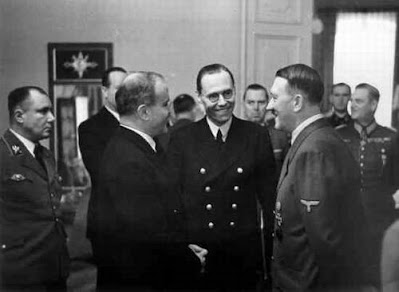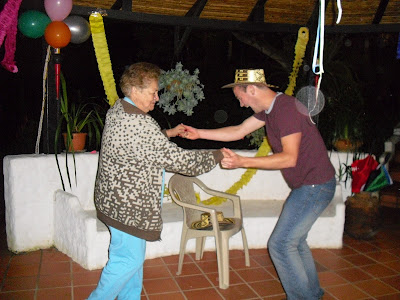We can all be wise after the event – most
of us, anyway. In an Irish context, we’ve had plenty of politicians and
economists claiming that — after the wheels so dramatically and disastrously
came off our false little boom — they knew the bust was coming well before it
arrived. If so, the majority of them did a very good job of keeping this
valuable information to themselves. Publicly making predictions or at least
sharing your thoughts on the future direction of events is something many of
our modern-day politicians shirk from.
 |
| 'So, which part of Poland can we have?' - Molotov, left, with Hitler. |
The same, however, cannot be said for the
former Soviet Union Foreign Minister Vyacheslav Molotov. Below is a speech he
made in Paris on 10 October 1946, on the policy of ‘equal
opportunity’ or the ‘open world’ economy that was beginning to take shape in
the West.
Considering how things have panned out in the 60-plus years since he uttered these words, you would have to say he wasn’t that far off the mark on much of what he foresaw here. Of course, depending on where you’re coming from, this ‘equal opportunity’ that Molotov feared is either good or bad.
Like most things, it’s probably a mixture of both. Right now many of the ‘liberated’ former Soviet states are probably quite happy to be in bed with, so to speak, the USA rather than Russia. There might come a time, though, when that stance will change. Whatever the case may be, you can make up your own mind on what ‘Prophet’ Molotov had to say:
Considering how things have panned out in the 60-plus years since he uttered these words, you would have to say he wasn’t that far off the mark on much of what he foresaw here. Of course, depending on where you’re coming from, this ‘equal opportunity’ that Molotov feared is either good or bad.
Like most things, it’s probably a mixture of both. Right now many of the ‘liberated’ former Soviet states are probably quite happy to be in bed with, so to speak, the USA rather than Russia. There might come a time, though, when that stance will change. Whatever the case may be, you can make up your own mind on what ‘Prophet’ Molotov had to say:
“We know that the United States made a very
great effort in this war, in defence of its own interests and of our common
aims, for which we are all grateful to that country. But for all that, it
cannot be said that the United States is one of those states which suffered
grave material damage in the Second World War, which were ruined and weakened in
this war. We are glad that this did not happen to our ally, although we
ourselves have had to go through trying times, the consequences of which will
take us long years to heal.
Now that you know the facts, place
side-by-side Romania, enfeebled by the war, or Yugoslavia, ruined by the German
and Italian fascists, and the United States of America, whose wealth has grown
immensely during the war, and you will clearly see what the implementation of
the principle of ‘equal opportunity’ would mean in practice. Imagine, under
these circumstances, that in this same Romania or Yugoslavia or in some other
war-weakened state, you have this so-called ‘equal opportunity’ for, let us
say, American capital – that is, the opportunity for it to penetrate unhindered
into Romanian industry or Yugoslav industry and so forth: what, then, will
remain of Romania’s national industry, or of Yugoslavia’s national industry?
It is surely not so difficult to understand
that if American capital were given a free hand in the small states ruined and
enfeebled by the war, as the advocates of the principle of ‘equal opportunity’
desire, American capital would buy up the local industries, appropriate the
more attractive Romanian, Yugoslav and all other enterprises and would become
the master in these small states. Given such a situation, we would probably
live to see the day when in your own country, on switching on the radio, you
would be hearing not so much your own language as one American gramophone
record after another or some piece or other of British propaganda.
The time
might come when in your own country, on going to the cinema, you would be
seeing American films sold for foreign consumption – and not those of better quality, but those manufactured in greater quantity and circulated and
imposed abroad by the agents of powerful firms and cinema companies which have
grown particularly rich during the war.
 |
| 'Eh, Minister Molotov, let's give the cinema a miss today.' |
Can anyone really fail to see that if, as a
result of the application of the principle of so-called ‘equal opportunity’ in
small states, unrestricted competition begins between the home products and the
products poured out by the factories of the United States or Great Britain,
nothing will remain of the sovereignty and independence of these states,
especially considering the post-war conditions? Is it not clear that such
unrestricted application of the principle of ‘equal opportunity’ in the given
conditions would in practice mean the veritable economic enslavement of the
small states and their subjugation to the rule and arbitrary will of strong and
enriched foreign firms, banks and industrial companies?
Is it not clear that if
such ‘principles of equality’ are applied in international economic life, the
smaller states will be governed by the orders, injunctions and instructions of strong
foreign trusts and monopolies? Was this what we fought for when we battled the
fascist invaders, the Hitlerite and Japanese imperialists?”
Well there you go. A visionary or what,
eh?
__________________________
Speech taken from: McCauley, Martin,
‘Seminar Studies in History – The Origins of the Cold War’, PP 119-121,
Longman, New York, 1990






